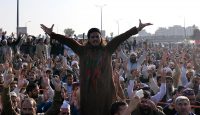
Has Pakistan’s new coalition government been handed a poisoned chalice?
After days of intense political bargaining following one of the most contested elections in Pakistan’s history, agreement was reached this week on a five-party minority coalition government led by former interim prime minister, Shahbaz Sharif, of the Pakistan Muslim League-Nawaz (PML-N).
The protracted negotiations between the centre-right PML-N and the centre-left Pakistan People’s Party (PPP) were complicated by a split mandate that failed – against all expectations – to produce a clear winning majority for the PML-N. Its credibility, and by extension the standing of the coalition, has been strongly challenged by former prime minister Imran Khan, leader of the Tehreek-i-Insaf (PTI), which denounced the coalition as ‘mandate thieves’.… Seguir leyendo »






